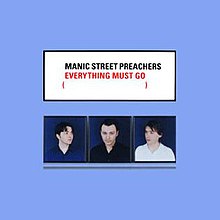Everything Must Go (Manic Street Preachers album)
| Everything Must Go | ||||
|---|---|---|---|---|
 |
||||
| Studio album by Manic Street Preachers | ||||
| Released | 20 May 1996 | |||
| Recorded | Autumn 1995–Winter 1996 | |||
| Studio |
|
|||
| Genre | ||||
| Length | 45:24 | |||
| Label | Epic | |||
| Producer | Mike Hedges | |||
| Manic Street Preachers chronology | ||||
|
||||
| Singles from Everything Must Go | ||||
|
||||
| Professional ratings | |
|---|---|
| Review scores | |
| Source | Rating |
| AllMusic | |
| Alternative Press | 5/5 |
| Entertainment Weekly | A |
| The Guardian | |
| Mojo | |
| NME | 8/10 |
| Q | |
| Select | 5/5 |
| Uncut | |
| Vox | 9/10 |
Everything Must Go is the fourth studio album by Welsh alternative rock band Manic Street Preachers. It was released on 20 May 1996, through Epic Records, and was the first record released by the band following the disappearance of lyricist and rhythm guitarist Richey Edwards.
Released at the height of Britpop in the mid-1990s, the album was a commercial and critical success, it reached its peak in the UK on separate occasions, debuting and peaking at number 2 in the UK Albums Chart and earned the band accolades in the 1997 Brit Awards. It represented a shift in the group's sound due to Edwards' departure, the album charted in mainland Europe, Asia and Australia, eventually selling over two million copies. Everything Must Go is frequently featured and voted highly in lists for one of the best albums of all time by many music publications such as NME and Q.
Singer-songwriter James Dean Bradfield said that the sound of the drums was crucial on the album to set the tone. He was inspired by the works of several bands : "I loved records like Pornography by The Cure and Joy Division records and Wire records and Magazine records and [Siouxsie and the] Banshees records and Wah! records and Associates records where everything starts with the drums". Producer Mike Hedges was the person the group had in mind since The Holy Bible in part for his production role on Siouxsie and the Banshees' single Swimming Horses which Bradfield loved. The band stayed in France in Normandy to work at Hedges' own studio which contained a mixing desk coming from the Abbey Road Studios.
...
Wikipedia
